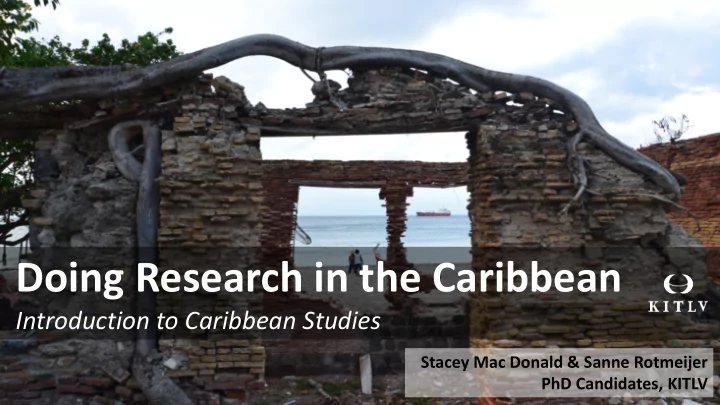

Doing Research in the Caribbean Introduction to Caribbean Studies Stacey Mac Donald & Sanne Rotmeijer PhD Candidates, KITLV
This afternoon… • Introducing ‘Confronting Caribbean Challenges’ research project • Key notions > Reflexivity & Positionality • Positioning in practice > Impact different positions on research • Discussion on reflexivity and positionality in the Caribbean
Confronting Caribbean Challenges project Website: www.kitlv.nl/research-projects-confronting-caribbean-challenges Facebook: www.facebook.com/ConfrontingCaribbeanChallenges
Nature Conservation & Cultural Heritage Stacey Mac Donald - Bonaire, Saba, St. Eustatius
News Media & National Identities Sanne Rotmeijer – Curaçao, St. Maarten
Question: How would you introduce yourself as a researcher in the Caribbean? (in key words)
Reflexivity & Positionality (1) Reflexivity is key notion in qualitative research Your own research instrument • Enhances quality of research • “[Reflexivity is] the process of a continual internal dialogue and critical self-evaluation of researcher’s positionality as well as (…) explicit recognition that this position may affect the research process and outcome”. Berger, R. (2015). Now I see it, now I don’t: researcher’s position and reflexivity in qualitative research. Qualitative research, 15, 219 – 234 .
Reflexivity & Positionality (2) Reflexivity works on two levels: • 1) Being self-reflexive about your own position-in-relation-to-others; 2) Being critically reflexive about institutional practices, policies, social structures, and knowledge bases. Cunliffe, A. L. (2016). “On Becoming a Critically Reflexive Practitioner” Redux: What Does It Mean to Be Reflexive?. Journal of Management Education , 40 (6), 740-746.
Positionality in context – KITLV & NL KITLV / NWO research funding // Relationship NL - Dutch Caribbean
Positioning in Practice: What to consider? Affiliation Personal Gender Sexual experiences orientation Beliefs (religion) Race (skin color) Political and Language ideological stances Immigration Biases status Age Preferences Emotional responses to participant Personal relationship w/ people (of the island) Berger, R. (2015). Now I see it, now I don’t: researcher’s position and reflexivity in qualitative research. Qualitative research, 15, 219 – 234.
Positioning in Practice: In relation to…(each)other. Reflexivity on position-in-relation-to-others: • You (are) shape(d) (by) others. • Your presence affects. • Ongoing process: Your presence shapes others, who shape you, who are shaped by others, who are shaped by you… etc.
Positioning in Practice: Ongoing process. Impacts all phases of the research process: • a. Prior– access to the field, recruitment of participants b. During– collecting data via Interviews and/or observations c. After – analyzing data, drawing conclusions Back to the field: always a starting point. •
Prior Asset Risk • Easier access Insider • Trust and cooperation • Blind spots • Head start topic knowledge • Too personal • Familiarity culture • Language understanding • Difficult access Outsider • Less trust and cooperation • Openness • Backlog topic knowledge • Less personal • Unfamiliarity culture • Language misunderstanding Berger, R. (2015). Now I see it, now I don’t: researcher’s position and reflexivity in qualitative research. Qualitative research, 15, 219 – 234 .
During Asset Risk • Imposing values, beliefs & Insider perceptions • Cultural intuition & insights • Projection of biases • Less distance • Participants withholding • Language & expressions information • Relationships based on respect, validation & Outsider • Missing clues & subtleties empowerment • Distance • Anonymity • Less comprehension • Participants sharing more information Berger, R. (2015). Now I see it, now I don’t: researcher’s position and reflexivity in qualitative research. Qualitative research, 15, 219 – 234 .
After Asset Risk Insider • Deafness to other voices • Sensitive to nuances: hear the unsaid • Blurred boundaries • Understanding • Maintain separation • Innovative directions • Indifferent to nuances Outsider • More diligent • Emotional misunderstanding (ignore, judge, or over- • Deliberate effort to empathize) understand Berger, R. (2015). Now I see it, now I don’t: researcher’s position and reflexivity in qualitative research . Qualitative research, 15, 219 – 234.
So… who is the black sheep?
Discussion & Questions Stacey Mac Donald | macdonald@kitlv.nl Sanne Rotmeijer | rotmeijer@kitlv.nl
Recommend
More recommend